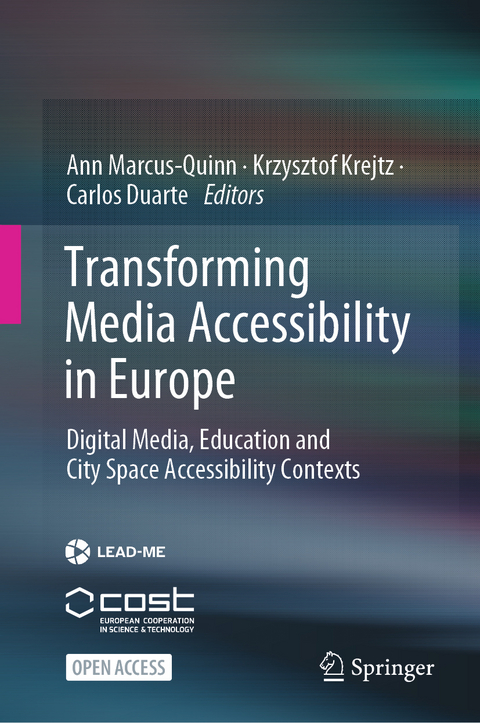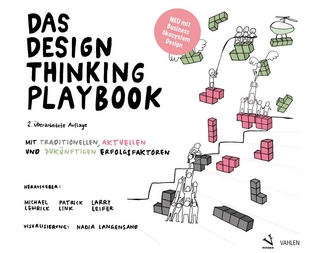
Transforming Media Accessibility in Europe
Springer International Publishing (Verlag)
978-3-031-60048-7 (ISBN)
In a rapidly evolving digital landscape, accessibility in media has emerged as a crucial frontier for inclusion, equality, and knowledge democracy.
The present edited volume "Transforming Media Accessibility in Europe: Digital Media, Education and City Space Accessibility Contexts" is a comprehensive exploration of technological, societal, psychological, and legal aspects of media accessibility in Europe. It offers a comprehensive roadmap for navigating the multifaceted landscape of media accessibility. Through compelling experimental studies, case studies, and forward-looking insights, it elucidates the transformative potential of accessible media across diverse sectors, including education, culture, and smart cities.
Crafted as a collaborative effort under the COST (European Cooperation in Science and Technology) LEAD-ME Action (CA19142), this book unites the expertise of researchers, educators, and practitioners. This is an open access publication.
Dr. Ann Marcus-Quinn is an Associate Professor in Technical Communication and Instructional Design at the University of Limerick, Ireland. She is the Course Director for the MA in Technical Communication and E-Learning and a Research Affiliate of the Economic and Social Research Institute (ESRI), Dublin, Ireland. Her research interests include eLearning, Open Educational Resources, accessibility, usability, instructional design, and the use of Information and Communication Technology (ICT) at the post-primary level. She has also completed research reports for international organisations including the EU Commission, the OECD and the European Disability Forum. Ann is a Working Group leader of the COST Action LEAD-ME (CA19142).
Dr. hab. Krzysztof Krejtz an Associate Professor of Psychology at SWPS University in Warsaw, Poland, where he is running the Eye Tracking Research Center. He holds a Psychology PhD from the University of Warsaw, Poland. He has been a guest professor at Ulm University (Germany). His research and teaching interests include inclusion and accessibility technologies, Human-Computer Interaction and Usability Research, visual attention and its dynamics, eye-tracking methods and statistics, and multimedia learning. Currently, he is leading the EU-funded COST Action (CA19142) entitled "LEAD-ME. The Leading Platform for European Citizens, Industries, Academia, and Policymakers in Media Accessibility".
Carlos Duarte is an Associate Professor at the Faculdade de Ciências of the University of Lisboa and a senior researcher at LASIGE, where he leads the Inclusive HCI Research Line. He holds a PhD (2008) in Computer Science from the Universidade de Lisboa. His main research interests combine accessibility and intelligent user interfaces to improve the user experience of different target populations. For the elderly, he has explored natural interaction for TV and mobile platforms, social networks and persuasive interfaces to improve their quality of life. For the blind, he has explored ways to improve web accessibility or body-based interaction techniques to improve interaction with mobile devices. Additionally, he has researched techniques for automating the evaluation of the accessibility of web pages. His work has improved QualWeb, a free, open-source, web accessibility evaluation engine. More recently, he has been exploring how conversational agents can be more accessible and how large language models can contribute to digital accessibility. He has published over 100 refereed technical and scientific papers and book chapters. He was the General Chair of W4A'20 and IUI'12 and Program Chair of W4A'19 and IUI'17. He led or participated in 15+ research projects, European and national. He leads one of the LEAD-ME action working groups. He is co-chair of the W3C ACT Rules Community Group where he contributes to harmonised interpretation of accessibility conformance testing. He was part of the W3C EOWG Task Force that is redesigning the curriculum for teaching Web Accessibility.
Introduction.- Part 1: Outside the screen.- Accessibility in tourism 5.0 approach: Enabling inclusive and meaningful tourist experiences.- Accessibility in public transport by example of Warsaw.- Subjectivity and creativity vs. audio description guidelines.- Gaze-Led Audio Description (glad). Concept and application to accessibility of architectural heritage.- Establishing an accessible university for students with disabilities: Case study of The Aksaray University.- Part 2: Inclusive art and society.- Digital constitutionalism and the data economy.- Making copyright management agile: Challenges and opportunities in audiovisual translation and media accessibility for a new digital era.- The inclusivity of art in city space. Activities of researchers from the University of Lodz to support people with sensory disabilities: A case study from Lodz (Poland).- Contemporary art and audio accessibility from translation studies- an essential binomial in current artistic creations.- Part 3: Learning and education.- An overview of media accessibility and inclusivity in the educational domain.- Media accessibility in education- combining bibliometric study and literature review.- Media accessibility in e-learning: Analyzing learning management systems.- Accessibility of ebooks for secondary school students in Ireland and Cyprus.- Examining the accessibility of online educational content - A case study of second-language learning videos.- Accessibility in technology-enhanced curricula - A comparative study in Portugal, Turkey, and Lithuania.- Cognitive accessibility in educational games - A set of recommendations.- Enabling digital literacy pedagogical sessions: A case study from Portugal.- Exploring the potential of media accessibility as a pedagogical tool: Students as audio describers.- Assessing the impact of assistive technologies on the lives of the hearing impaired: A bibliometric analysis.- Part 4: Technological innovations for accessibility.- Academic training in media accessibility in audiovisual translation at a university level: The case of the Spanish university system.- Digital media tools for accessibility and inclusion: A case study from the Ukraine.- A multimodal approach for improving a dialogue agent for therapeutic sessions in psychiatry.- Control the stream of sounds: A pilot study on intersemiotic translation of sound effects and music for subtitling for the d/deaf and hard of hearing in German, Spanish and English in VOD platforms.
| Erscheinungsdatum | 20.08.2024 |
|---|---|
| Zusatzinfo | XVII, 428 p. 63 illus., 52 illus. in color. |
| Verlagsort | Cham |
| Sprache | englisch |
| Maße | 155 x 235 mm |
| Themenwelt | Mathematik / Informatik ► Informatik ► Betriebssysteme / Server |
| Mathematik / Informatik ► Informatik ► Grafik / Design | |
| Informatik ► Software Entwicklung ► User Interfaces (HCI) | |
| Sozialwissenschaften ► Pädagogik ► Sonder-, Heil- und Förderpädagogik | |
| Schlagworte | Accessibility Legislation • Artificial Intelligence • cultural heritage • Digital learning environments • Emerging Technologies • Media Accessibility • open access |
| ISBN-10 | 3-031-60048-7 / 3031600487 |
| ISBN-13 | 978-3-031-60048-7 / 9783031600487 |
| Zustand | Neuware |
| Informationen gemäß Produktsicherheitsverordnung (GPSR) | |
| Haben Sie eine Frage zum Produkt? |
aus dem Bereich


